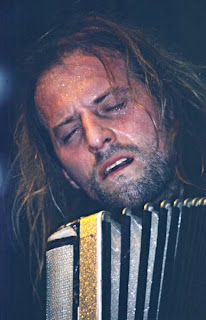... "Brahms had a curious relation with the piano. As a young man, he made his reputation as a virtuoso pianist and in those early years composed huge works in
classical forms: of his first five published works, three are massive piano sonatas, all written before he was 21, and there are sets of variations from this period that rank among the most difficult piano music ever written. The composer, described in these years by a friend as “the young, heaven-storming Johannes,” seemed on the verge of creating a vast (and heroic) literature for solo piano. But then an unexpected thing happened: at age 32 Brahms simply stopped writing music for solo piano. Over the final three decades of his life, he returned to the genre only twice: in 1878-9 (when he composed 10 brief pieces) and at the very end of his life" ...
From
Eric Bromberger's superb program notes to this Sunday's [October 28] Murray Perahia 4 PM piano recital of Bach, Beethoven, Chopin, and Brahms, hosted by the
Washington Performing Arts Society, at The Music Center at Strathmore, Maryland.
(c) Washington Performing Arts Society 2007. All rights reserved.
*
Friday, October 26, 2007 at 8 PM
University of Maryland Symphony Orchestra Celebrates 20th Century Master Composers and PoetsJames Ross, music director
Yevgeny Yevtushenko, guest poet
Men of UM Choirs
David Brundage, bass
The University of Maryland Symphony Orchestra's second concert of 2007-8 opens with Jean Sibelius's one-movement masterpiece, Symphony No. 7 in C Major, op 105. Then the UMSO is joined by acclaimed Russian poet Yevgeny Yevtushenko for a performance of Dmitri Shostakovich's politically charged Symphony No. 13, op. 113 “Babi Yar,” inspired by Yevtushenko's famous poem about the 1941 Soviet-concealed Nazi massacre in Kyiv, Ukraine, the Soviet Union. Yevtushenko will read the poem as an introduction to the performance.
*
Friday, October 26, 2007 at 8:00 pm
Fred Hersch Celebrates American Creativity: The Composer-Performer“a rare and disarming combination of oddball ideas and dizzying beauty”
Fred Hersch, piano / Blair McMillen, piano / The Gramercy Trio
First in a series of composer portraits of major jazz figures.
Part of The MacDowell Colony Centennial Celebration
6:15 pm – Whittall Pavilion (no tickets required)
Pre-concert presentation - Larry Appelbaum, Music Division/Host of the WPFW radio’s Sound of Surprise, talks to Fred Hersch about his experience at The MacDowell Colony.
*
Saturday, October 27, 2007 at 3:30 PM
Persian National Music Ensemble Celebrates RumiMeyer Auditorium, Freer Gallery of Art
This five-member ensemble from Baltimore recites Rumi's poetry in English, tells famous stories about the mystic-poet, and then performs his poems in Persian, accompanied by santur (hammered dulcimer), tar (lute), violin, and percussion. Director and composer Ahman Borhani taught music at Ferdowsi University in Iran and is a specialist on the life and poetry of Rumi.
*
Sat., Oct. 27, at 5:00 PM
The 21st Century Consort Celebrates Captivating LandscapesInspired by SAAM’s exhibitions Earl Cunningham’s America and Over the Top: American Posters from World War I, the Consort performs music by Charles Ives, Jessica Krash, David Behrman, Shulamit Ran, John Cage, and Daniel Kellogg. With William Sharp, baritone.
*
Sun., Oct. 28, 2007, at 6:30 PM
National Gallery of Art Celebrates Outstanding Classical and Contemporary Music in Service To The CommunityJon Manasse, clarinetist
Jon Nakamatsu, pianist
Music by Brahms, Novacek, Weber, Mendelssohn, Kovacs, and Ravel
West Building, West Garden Court
Concert Notes Program includes:
Johannes Brahms (1833 – 1897)
Sonata in F Minor for Clarinet and Piano, op. 120, no. 1 (1894)
Allegro appassionato
Andante un poco adagio
Allegretto grazioso
Vivace
*
Sunday, October 28, 2007 7:30pm
Choral Arts Society of Washington Celebrates a Pre-Post Modernist Musical Heritage: An Evening of Russian MusicKennedy Center Concert Hall
Antony Walker, guest conductor
Artistic Director, Washington
Concert Opera
Norman Scribner, conductor
Alessandra Marc, soprano
Laura Zuiderveen, mezzo-soprano
Paul Austin Kelly, tenor
Robert Pomakov, bass
Sergei Rachmaninoff
The Bells
Masterpieces from the Golden Age
of Russian Opera:
Mussorgsky
Coronation Scene (Boris Godunov)
Tchaikovsky
Ballroom Scene (Eugene Onegin)
Prokofiev
Final Scene (Alexander Nevsky/film); and more
Study Guide For Adults and Students
The Adams Memorial in Section E of Rock Creek Cemetery, Washington, D.C. Erected in 1891 by Henry Adams as memorial to his wife "Clover" Adams. Bronze allegory of "the Peace of God or The Mystery of the Hereafter...beyond pain and beyond joy" (often called Grief) sculpted by Augustus Saint-Gaudens, in a setting designed by Stanford White. Image is cropped from an Historic American Buildings Survey (HABS DC,WASH,384-4) photo by Jack E. Boucher, circa 1974.
Photo credit: This work is in the public domain in the United States because it is a work of the United States Federal Government under the terms of 17 U.S.C. § 105.














































